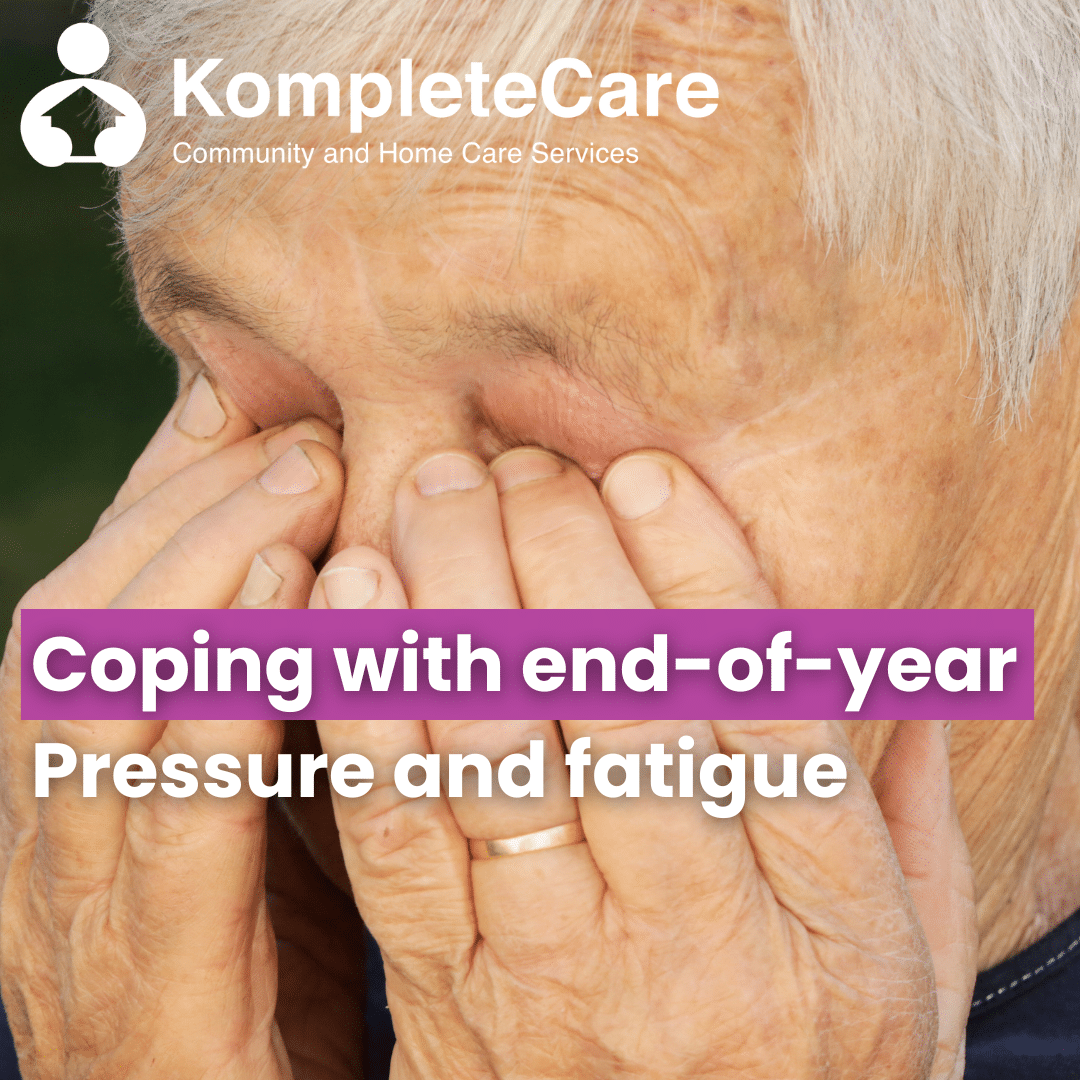As the year draws to a close, many Australians are taking time to rest, reflect, and reconnect. But for some, this period can bring added pressure. The end of the year often disrupts routines, increases fatigue, and heightens emotional strain, creating the perfect conditions for burnout; particularly among those already managing complex health needs.
Burnout is not confined to the workplace; it occurs when ongoing demands exceed a person’s ability to cope, leading to physical, emotional, and mental exhaustion. If left unmanaged, it can contribute to poorer health, reduced concentration, and increased social withdrawal. For those managing health needs, these effects can be particularly concerning, compounding existing challenges and limiting independence. Managing end of year burnout is, therefore, less about indulgence and more about maintaining stability.
Recognising these challenges, KompleteCare understands the importance of raising awareness about the impact of burnout and the need to protect one’s quality of life. Through our person-centred approach, we know that true vitality is sustained not only through day-to-day support, but also through meaningful connection, purpose, and emotional strength.
Why those receiving care are especially vulnerable
Research and national data highlight that mental distress is common among older Australians in care settings, with many experiencing anxiety, depression, grief, loss of independence, and social isolation; all of which can intensify stress. Among those living with disability, psychological distress also remains a significant concern, with around one in three adults reporting high or very high levels of distress. When additional pressures arise, these risks can quickly escalate.
The broader care system is also under pressure. Across aged care and disability support sectors, workforce shortages, high turnover, and limited resources have created ongoing strain. Such systematic stress not only affects workers but can also reduce the quality and consistency of care received. When the system is stretched, those relying on it feel the impact most acutely – a reality acknowledged by providers committed to providing continuous support, like KompleteCare.
For people already managing complex health needs, burnout can quickly diminish energy, motivation, and overall quality of life; underscoring the importance of proactive wellbeing strategies as the year draws to a close.
Strategies to prevent and manage end of year burnout
While burnout can feel inevitable, there are evidence-based ways to reduce its impact and maintain wellbeing. These approaches include:
Restoring routines where possible
Maintaining consistency in daily life helps to stabilise mood and reduce mental fatigue. Regular mealtimes, sleep patterns, and familiar rituals provide a sense of structure. Even when the holiday period brings change, small anchors—such as a morning cup of tea or a favourite TV program—can offer comfort and predictability.
Prioritising pacing and rest
Energy levels often fluctuate more at the end of the year. Breaking activities into smaller, manageable tasks and allowing time for rest can help prevent exhaustion. Light movement, breathing exercises, or simply pausing to relax can have restorative effects.
Setting realistic expectations
The holiday season often brings added social pressure. It is okay to adjust or decline activities that feel overwhelming. Establishing boundaries around rest, quiet time, or visitor limits helps protect physical and emotional energy.
Seek help early
If feelings of fatigue, sadness, or withdrawal persist, reaching out for support is important. Talking to a GP, counsellor, or trusted support worker can help identify early signs of burnout and connect individuals with available resources; a reminder often echoed by providers like KompleteCare.
Preventing burnout among those receiving care requires more than individual strategies, it also depends on the systems that surround them. Sustainable care models, adequate staffing, and accessible mental health services all play a role in protecting wellbeing and ensuring continuity of care.
By recognising burnout as both a personal and collective issue, communities and providers can help create an environment where rest and recovery are not afterthoughts, but essential parts of care. As the year concludes, maintaining balance, stability, and connection can help ensure this time remains one of comfort and reflection, not exhaustion.
Through our person-centred approach, KompleteCare provides compassionate, balanced support that recognises the importance of both physical and emotional health. By promoting connection and understanding within the community, we demonstrate how genuine care involves supporting the whole person, including the need to rest, recharge, and restore.
If you, or a loved one, requires support, give our friendly team a call today on (08) 8265 5696 or fill out the Enquiry Form via our website.








